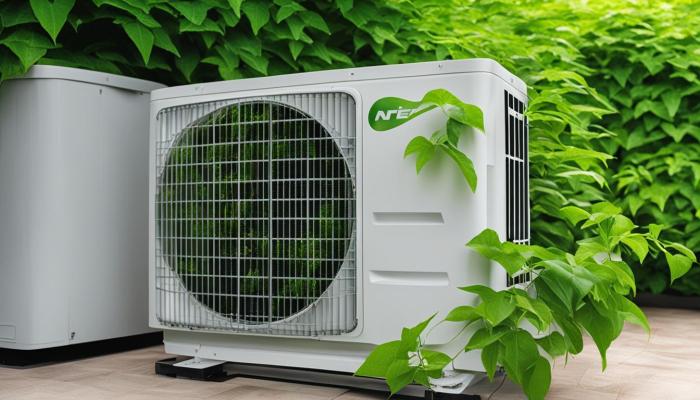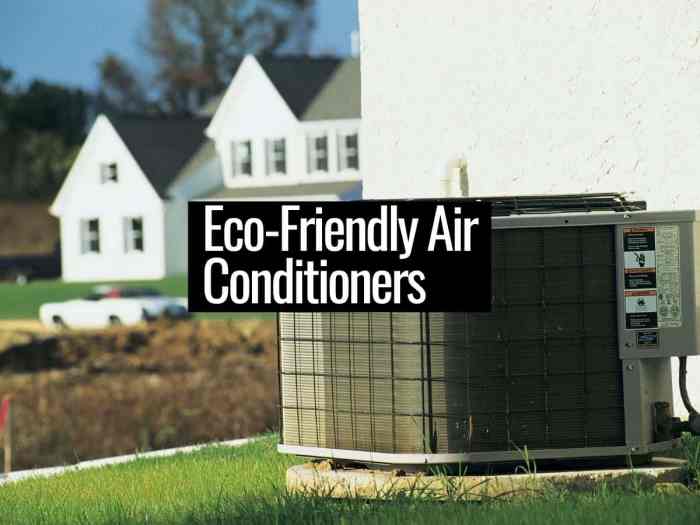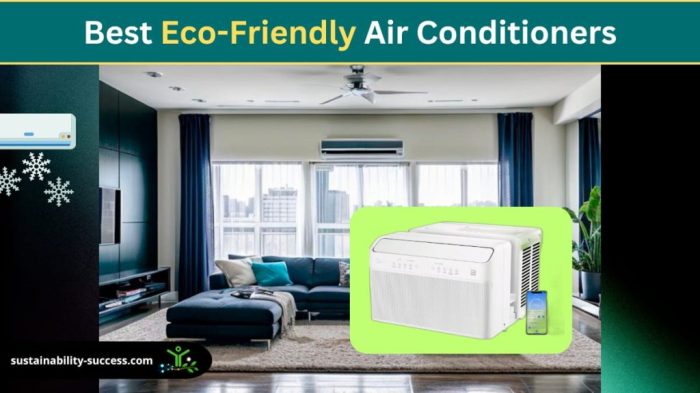Eco-Friendly Air Conditioners: A Sustainable Choice – A Comprehensive Guide
Exploring the realm of Eco-Friendly Air Conditioners: A Sustainable Choice opens doors to a world of innovation and environmental consciousness. Let's delve into the intricacies of these systems, uncovering their benefits, features, and impact on our surroundings.
As we navigate through the details of eco-friendly air conditioners, a new perspective on sustainability and energy efficiency emerges, reshaping our understanding of cooling technologies.
Benefits of Eco-Friendly Air Conditioners

Using eco-friendly air conditioners offers a range of benefits, not only for the environment but also for homeowners in terms of energy efficiency and cost savings.
Environmental Advantages
Eco-friendly air conditioners use refrigerants that have a lower impact on the environment compared to traditional systems. These refrigerants are designed to minimize greenhouse gas emissions, contributing to a reduction in carbon footprint. By choosing eco-friendly AC units, individuals can help protect the ozone layer and combat climate change.
Energy Consumption Reduction
One of the key advantages of eco-friendly air conditioners is their ability to reduce energy consumption. These systems are designed to operate more efficiently, utilizing advanced technologies such as variable-speed compressors and smart thermostats. By optimizing energy usage, eco-friendly AC units help lower electricity bills and reduce overall energy demand.
Long-Term Cost Savings
While eco-friendly air conditioners may have a higher upfront cost compared to conventional models, the long-term savings they offer are significant. By consuming less energy and requiring fewer repairs and maintenance, eco-friendly AC units can lead to substantial cost savings over their lifespan.
Additionally, some governments and utility companies offer incentives or rebates for installing energy-efficient appliances, further enhancing the financial benefits of eco-friendly air conditioners.
Features of Eco-Friendly Air Conditioners
Eco-friendly air conditioners are designed with advanced technology to minimize their environmental impact while providing efficient cooling. These units offer several key features that set them apart from traditional AC systems.
Energy Efficiency Ratings
One of the main features of eco-friendly air conditioners is their high energy efficiency ratings. These units are designed to consume less electricity compared to traditional AC units, resulting in lower energy bills and reduced carbon emissions. The technology used in eco-friendly air conditioners allows them to cool a space effectively while using minimal energy.
Sustainable Materials
Eco-friendly air conditioners are also manufactured using sustainable materials to reduce their environmental footprint. Companies are increasingly using recycled materials and components that are less harmful to the environment during production. By opting for eco-friendly air conditioners, consumers can support the use of sustainable materials and promote a greener approach to cooling their spaces.
Installation and Maintenance of Eco-Friendly Air Conditioners

Proper installation and regular maintenance are essential to ensure the optimal performance and longevity of eco-friendly air conditioners.
Installation Tips
- Always hire a professional HVAC technician to install your eco-friendly air conditioner to ensure it is done correctly and efficiently.
- Position the unit in a shady spot to reduce energy consumption and increase its efficiency.
- Ensure proper insulation around the unit to prevent air leaks and improve cooling efficiency.
- Follow the manufacturer's instructions carefully to avoid any potential issues during installation.
Maintenance Requirements
- Regularly clean or replace the air filters to maintain good indoor air quality and keep the unit running efficiently.
- Check and clean the evaporator and condenser coils to prevent dirt buildup and maintain proper airflow.
- Inspect the refrigerant levels and ensure there are no leaks to maintain the cooling efficiency of the unit.
- Keep the outdoor unit free from debris and vegetation to ensure proper airflow and prevent overheating.
Importance of Regular Servicing
Regular servicing by a professional technician can help extend the lifespan of your eco-friendly air conditioner by identifying and addressing any potential issues before they escalate. It can also help maintain the unit's energy efficiency and prevent costly repairs in the future.
Impact on Indoor Air Quality
Eco-friendly air conditioners play a crucial role in improving indoor air quality by effectively filtering out pollutants and contaminants. These units are designed with advanced filtration systems that help in enhancing air purity within enclosed spaces.
Filtration Systems
- Most eco-friendly air conditioners utilize high-efficiency particulate air (HEPA) filters that can capture tiny particles such as dust, pollen, mold spores, and pet dander.
- Activated carbon filters are also commonly used to absorb odors, volatile organic compounds (VOCs), and other harmful gases present in the air.
- Some units may incorporate photocatalytic filters that can break down pollutants like bacteria and viruses when exposed to UV light.
Health Benefits
- Breathing cleaner air in spaces equipped with eco-friendly AC systems can lead to improved respiratory health and overall well-being.
- Reduced exposure to airborne pollutants can help prevent respiratory issues, allergies, and other health conditions associated with poor indoor air quality.
- Individuals with asthma or allergies may experience relief from symptoms and find it easier to breathe in environments with purified air.
Last Word

In conclusion, Eco-Friendly Air Conditioners: A Sustainable Choice not only offers a greener alternative for cooling but also promises long-term benefits for both the environment and our wallets. Embracing these systems is a step towards a more eco-conscious future.
Questions Often Asked
How do eco-friendly air conditioners help reduce energy consumption?
Eco-friendly air conditioners utilize advanced technology such as inverter compressors and smart thermostats to optimize energy usage, resulting in lower electricity bills.
What are the maintenance requirements for eco-friendly air conditioners?
Regular filter cleaning, annual professional servicing, and ensuring proper insulation are essential for maintaining the optimal performance of eco-friendly air conditioners.
How do eco-friendly air conditioners contribute to better indoor air quality?
These systems employ high-quality filtration mechanisms that remove allergens, pollutants, and contaminants from the air, promoting cleaner and healthier indoor environments.